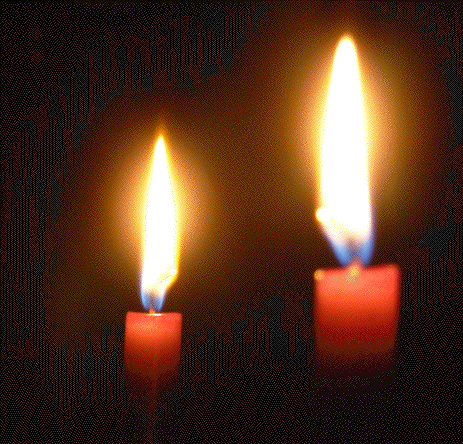
Chemical History of the Candle
Chat times for Summer 2025
SUMMER COURSE
Wednesday
11:00a-12:30p ET/8:00a-9:30a PT
Dr. Christe Ann McMenomy

Labs
Performing Experiements on the Chemical History of the Candle
Lab assignments for this course are not optional — they are the point of the course! Students perform one major lab exercise each week and need to set aside a regular time for completing their lab work and writing up their reports. Please take this into consideration if your student is planning other activities, such as a travel or summer camp, which may make performing experiments on a regular basis impossible.
- Instructions for all labs will be available to enrolled students at the beginning of the course.
- Each student should perform the lab to the best of his or her ability as soon as possible in the week period before the chat session.
- Each student must then write up a lab report, which should contain the following sections (note that you should supply enough detail that I or any of your fellow students could duplicate your experiment or observations, assuming we can obtain the same materials you used):
- your goal for observation, or the hypothesis you wish to test
- a list of the materials you used
- a description of the procedure you followed
- a record of your observations or data, presented in an appropriate format your conclusions (i.e., did you support or disprove the hypothesis?)
- at least one suggestion for how to alter the materials or procedure in order to improve the accuracy of your results.
- Lab reports must be posted in the Moodle Candle forum by 6pm EST of the evening before our chat session, so that all students have time to review each others' work.
- Students will respond with constructive criticism about the lab procedures, as well as the lab report content and style of presentation.
- Students should also post any questions they have about what happened in the lab and why, in the general class forum.
Lab Permission Forms
For safety reasons, both you and your parents must read the safety procedures before starting the lab sequence. Parents of minor students must sign and send a copy of the lab permission letter to me before I can accept any lab reports from their student.
Lab Equipment
Most labs will require the use of one or more of the following items. Optional items for some labs are listed in italics. [This list is not yet complete.]
- Lab Notebook. This should be a spiral-bound notebook containing graph paper, 8" x 6" or larger, on which you can make written notes, drawings, and tables of data. We will discuss preparing your notebook in our first lab session.
- Cookie sheet or aluminum foil to protect working surface from wax drips
- One parafin taper or votive candle
- One beeswax candle
- One oil lamp (decorative) or alcohol lamp (may come as part of a chemistry set)
- Strong flashlight, slide projector, or direct sunlight
- White paper large enough to act as a screen (you may tape printer paper together, but you should have a rigid board or wall on which to place it)
- A short candle with a good wick.
- A deep pan or bowl in which you can put at least a quart of water.
- Matches
- A wax marker like a crayon OR tape which will stick to glass OR a silver "glass" pen, for marking glass.
- A liquid measure, graduated to as much accuracy as possible (a cup measure will do, a cylindar graduated in mL is better).
- Large heat-proof glass jars (canning jars), or pyrex or kimex chemistry beakers.
- Glass or metal funnels (2 if possible)
- Heat-proof small jars (such as olive jars or spice jars), or test tubes
- Insulated copper wire (bell wire, for example)
- One 6 Volt battery, or two C or D cells, taped together
- Two feet of rubber tubing (available at the hardware store)
- Short piece of heat-proof glass tubing (try using GLASS eyedroppers, if available)
- Lime (CaO). You may use lime bought to treat soil for gardening, or purchase a small amount from a supplier like Home Science Tools.
Students who wish to conduct labs for AP credit in the academic year course should review the AP Chemistry course laboratory requirements and textbook information for the equipment, materials, and manuals required for that course and notify the instructor of their intent to work on AP labs.
Sources
Non-AP labs require only household equipment. If you want to pursue more exotic experiments with your candles, you may also want to check my growing list of mail order suppliers.
© 2005 - 2025 This course is offered through Scholars Online, a non-profit organization supporting classical Christian education through online courses. Permission to copy course content (lessons and labs) for personal study is granted to students currently or formerly enrolled in the course through Scholars Online. Reproduction for any other purpose, without the express written consent of the author, is prohibited.